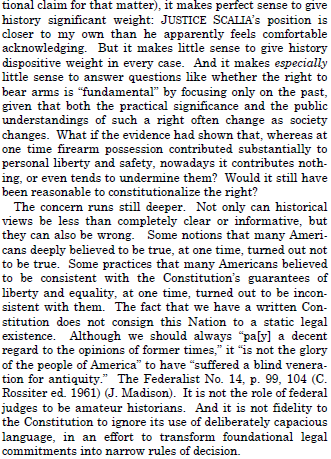Minutes ago, the U.S. Supreme Court issued an opinion which makes the Second Amendment applicable to states and municipalities. This is big.
A quick background. The U.S. Constitution applies to the federal government (what it can and can't do). The rights protected by the Bill of Rights (freedom of speech, etc.) don't necessarily apply to states and municipalities unless and until the U.S. Supreme Court says so.
It's a concept known as incorporation, and it didn't exist until the 14th Amendment (written in the wake of the Civil War).
The 14th Amendment basically says that the privileges and immunities of being a federal citizen cannot be taken away by the state. That's all well and good, but it is unclear what the "privileges and immunities of being a federal citizen" are.
The 14th Amendment also says that life, liberty and property cannot be taken away without due process. And again, the question has arisen what those liberties are.
But whenever a right or privilege or immunity is applied against states, that is known as "incorporation". Most of the Bill of Rights have been incorporated. Some haven't (like the right to a jury trial in civil cases – 8th Amendment).
The Supreme Court in 1875 addressed this issue in United States v. Criukshank, and decided that the Second Amendment is not binding on states.
Now, as of today, the Second Amendment — the right to bear arms — has been incorporated and applied to states, cities, etc.
The case arose when the City of Chicago tried to ban handguns, and it asked the basic question as to whether a municipality can ban handguns. The answer is "no", because the Second Amendment now applies to Chicago as well as every other city, town, county, or state. It's a huge win for the pro-gun people, and it calls into question all existing state and local laws regarding firearms.
The case fell 5-4, with Stevens. Breyer, Sotomayor, and Ginsberg in dissent.
Full opinion(s) here (PDF)
UPDATE — SOME QUICK ANALYSIS:
The majority (except Thomas) take the position that the right to self-defense is a fundamental right, and fundamental rights cannot be taken away without due process. Therefore, the Second Amendment is incorporated under the Due Process Clause of the 14th Amendment. Thomas, it seems would incorporate the Second Amendment under the Privileges and Immunities Clause of the 14th Amendment.
In his lengthy dissent, Stevens says basically, "Okay. If you see the right of self-defense has a fundamental right, that's one thing. But when it comes to handguns — which is what this case is about — you are assuming that the allowance of handguns is inextricably bundled with that fundamental self-defense right." Basically, Stevens says, we are talking about regulating property — a chattel — a thing. You can still have the right of self-defense without that particular thing. (He's quite right about this — if you follow the majority reasoning, then people should be able to own bazookas "in self-defense").
He also argues that while handguns can be used for self-defense, they can also be used for offense, too. In other words, handguns take away liberties just as much (if not more) than they protect them."
Actual Stevens quote: "Your interest in keeping and bearing a certain firearm may diminish my interest in being and feeling safe from armed violence". (emphasis in original)
Stevens really has a go at Justice Scalia, and vice versa. Scalia, ever the strict constructionist now "finds" there is a "right of self-defense" in the Constitution, where such words don't actually exist. (And if you read the Second Amendment, with its reference to the well-regulated militia, it is very hard to claim that it explicitly gives individuals a personal right to self-defense). Stevens is basically calling Scalia a hypocrite, which he is.
In taking on Scalia, Stevens makes an interesting point. Suppose the right to bear arms was once a fundamental personal right in the past, because of the situation in the past. But what if it isn't now (because times change)? Should we ignore that? Should we close a blind eye to the fact that technology have made guns cheap and available and can be used to kill people not in self-defense?
In fact, Stevens is going beyond the gun issue to attack Scalia's whole approach when he (Scalia) hangs on to history. I love this part….
Good stuff. Stevens is retiring, and this is firing shot (no pun intended) at Scalia.


